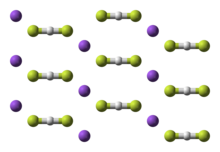Potassium bifluoride
Appearance
(Redirected from Potassium hydrogendifluoride)

| |
| Names | |
|---|---|
| IUPAC name
Potassium bifluoride
| |
| Other names
Potassium hydrogen difluoride
| |
| Identifiers | |
3D model (JSmol)
|
|
| ChemSpider | |
| ECHA InfoCard | 100.029.233 |
| EC Number |
|
PubChem CID
|
|
| RTECS number |
|
| UNII | |
| UN number | 1811 |
CompTox Dashboard (EPA)
|
|
| |
| |
| Properties | |
| K[HF2] | |
| Molar mass | 78.103 g/mol |
| Appearance | colourless solid |
| Odor | slightly acidic |
| Density | 2.37 g/cm3 |
| Melting point | 238.7 °C (461.7 °F; 511.8 K) |
| Boiling point | decomposes |
| |
| Solubility | soluble in ethanol |
| Structure | |
| monoclinic | |
| Thermochemistry | |
Std molar
entropy (S⦵298) |
45.56 J/(mol·K) [1] |
Std enthalpy of
formation (ΔfH⦵298) |
-417.26 kJ/(mol·K) |
| Hazards | |
| GHS labelling:[2] | |
 
| |
| Danger | |
| H301, H310, H314 | |
| P260, P262, P264, P270, P280, P301+P310, P301+P330+P331, P302+P350, P303+P361+P353, P304+P340, P305+P351+P338, P310, P321, P322, P330, P361, P363, P405, P501 | |
| Flash point | non flammable |
| Related compounds | |
Other anions
|
Potassium fluoride |
Other cations
|
Sodium bifluoride, ammonium bifluoride |
Except where otherwise noted, data are given for materials in their standard state (at 25 °C [77 °F], 100 kPa).
| |
Potassium bifluoride is the inorganic compound with the formula K[HF2]. This colourless salt consists of the potassium cation (K+) and the bifluoride anion ([HF2]−). The salt is used as an etchant for glass. Sodium bifluoride is related and is also of commercial use as an etchant as well as in cleaning products.[3]
Synthesis and reactions
[edit]The salt was prepared by Edmond Frémy by treating potassium carbonate or potassium hydroxide with hydrofluoric acid:
- 2 HF + KOH → K[HF2] + H2O
With one more equivalent of HF, K[H2F3] (CAS RN 12178-06-2, m.p. 71.7 °C[4]) is produced:
- HF + K[HF2] → K[H2F3]
Thermal decomposition of K[HF2] gives hydrogen fluoride:
- K[HF2] → HF + KF
Applications
[edit]The industrial production of fluorine entails the electrolysis of molten K[HF2] and K[H2F3].[3] The electrolysis of K[HF2] was first used by Henri Moissan in 1886.
See also
[edit]References
[edit]- ^ Westrum, Edgar F. Jr.; Pitzer, Kenneth S. (June 1949). "Thermodynamics of the System KHF2-KF-HF, Including Heat Capacities and Entropies of KHF2, and KF. The Nature of the Hydrogen Bond in KHF2". J. Am. Chem. Soc. 71 (6): 1940–1949. doi:10.1021/ja01174a012.
- ^ "Potassium bifluoride". pubchem.ncbi.nlm.nih.gov. Retrieved 27 December 2021.
- ^ a b Aigueperse, Jean; Mollard, Paul; Devilliers, Didier; Chemla, Marius; Faron, Robert; Romano, René; Cuer, Jean Pierre (2000). "Fluorine Compounds, Inorganic". Ullmann's Encyclopedia of Industrial Chemistry. Weinheim: Wiley-VCH. doi:10.1002/14356007.a11_307. ISBN 3527306730.
- ^ Ažman, A.; Ocvirk, A.; Hadži, D.; Giguère, Paul A.; Schneider, Michel (1967-06-15). "Infrared spectra of KH2F3 and the structure of the H2F3− ion". Canadian Journal of Chemistry. 45 (12). Canadian Science Publishing: 1347–1350. doi:10.1139/v67-222. ISSN 0008-4042.
